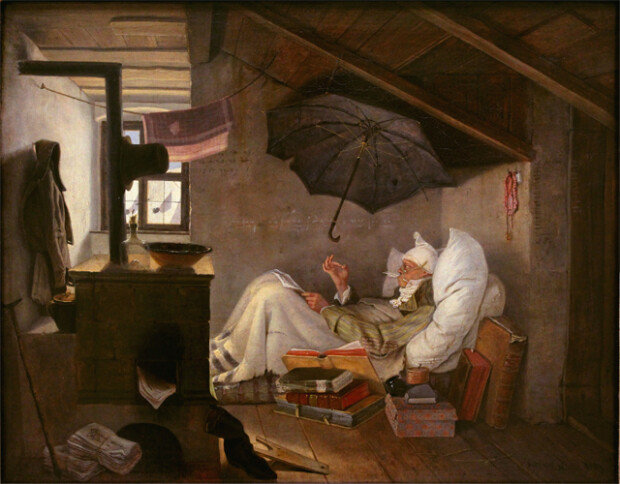The painting even Hitler loved
The painting even Hitler loved
Posted August. 15, 2019 07:35,
Updated August. 15, 2019 07:35

A piece of poetry can make a greater impression than an hour-long speech. But the life of a poet is not that easy. Carl Spitzweg, 19th-century German romantic painter, earned a reputation for his painting “The Poor Poet,” which depicted the subject’s miserable life with much wit. In the painting, an old poet is lying on a shabby mattress in an attic. He is holding a quill pen in his mouth and counting something with his fingers. An umbrella is unfolded to catch the rainwater falling from above and his writings are being used as firewood. This is not an ideal image of a genius poet but the reality of a destitute poet.
The painting itself criticizes the poor environment for artists but the poet in the painting never looks unhappy because it is the life he chose. The cone-shaped hat the poet is wearing is reminiscent of the Phrygian cap, which acted as the symbol of freedom and resistance during the French Revolution. The hat shows the poet’s willingness to resist the social norms and customs and realize freedom and ambitions even if that means having to live a poor life. The painting also reminds one of the famous saying by John Stuart Mill: “It is better to be a human dissatisfied than a pig satisfied.” It reflects the spirit of the times that encourages people to pursue emotional pleasure rather than to be captivated by material desires.
Spitzweg was originally a pharmacist but became a full-time painter at the age of 25 when he inherited his father’s property. Being a self-educated painter, Spitzweg was sharply critical of the ordinary lives of German middle-class and German society in his paintings. But few noticed his intention because the characters in his paintings were so friendly and funny. Even Adolf Hitler loved “The Poor Poet.” According to a survey, “The Poor Poet” was Germans’ favorite painting following “The Mona Lisa.” A poet enduring the difficulties in reality for the sake of freedom and ideals is the icon representing the identity of German people. That is why the painting is still loved by many Germans.
tjdrud0306@donga.com






![[김순덕 칼럼]팥쥐 엄마 ‘원펜타스 장관’에게 700조 예산 맡길 수 있나](https://dimg.donga.com/c/138/175/90/1/wps/NEWS/IMAGE/2026/01/21/133206359.1.jpg)
